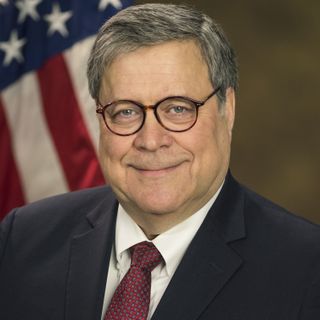AG Barr Praises FCC Ligado Item as Helping Beat China to 5G
FCC chair Ajit Pai's circulation of an item approving Ligado's long-standing request to launch a terrestrial broadband service using satellite spectrum drew a immediate response Thursday from interested observers inside the Beltway, including the attorney general.
The FCC has been vetting one or another variation of that proposal for most of a decade--the company was originally called LightSquared--and what was initially billed as a 4G service is now promoted for 5G and IoT.

GPS users, including federal agencies like the Department of Defense, had complained of potential adjacent band interference from the Ligado proposal, but Pai said the FCC has determined a conditioned approval can promote that 5G use of midband (L-band) spectrum without harmful interference.
But at least one head of a federal agency, attorney General Bill Barr was pleased and urged the other FCC commissioners to follow Pai's lead.
“I applaud FCC chairman Pai's proposal to make available L-band spectrum, to be used together with C-band spectrum, for deployment of advanced wireless services, including 5G," he said in an emailed statement. "As I said in my speech at the Center for Strategic and International Studies, swift FCC action on spectrum is imperative to allow for the deployment of 5G. This is essential if we are to keep our economic and technological leadership and avoid forfeiting it to Communist China. Freeing up L-band spectrum for use in tandem with the C-band, as the Chairman proposes, should greatly reduce the cost and time it will take to deploy 5G throughout the country and would be a major step toward preserving our economic future. I hope the full Commission moves forward quickly."
CTIA suggested the lengthy process had been an issue.
“We're pleased to see that the FCC has managed to cut through the red tape to make a decision on Ligado," said CTIA SVP and general counsel Tom Power. "This multi-year process reveals the challenges at play in our nation’s spectrum policy and the need for stronger support for new commercial wireless services. We need to all learn lessons from this process and ensure that decisions on key spectrum bands like lower 3 GHz occur in a more expedited and collaborative manner.”
Multichannel Newsletter
The smarter way to stay on top of the multichannel video marketplace. Sign up below.
“I commend chairman Pai for circulating a draft order to approve Ligado’s applications, which will make much-needed mid-band spectrum, specifically L-band spectrum, available for terrestrial use," said Competitive Carriers Association president Steven Berry. "This long-awaited, positive progress comes at a critical time for all Americans, particularly those in rural areas, who are relying on mobile connections and services more than ever before. Mid-band spectrum provides real opportunities for deploying next-generation technologies, and competitive carriers are eager to access this valuable resource to expand and enhance their networks. I thank the chairman for taking steps to approve the applications and look forward to continued work to bring robust mobile broadband to all corners of the US as quickly as possible."
Michael Calabrese, a member of the National Telecommunications & Information Administration's Commerce Spectrum Management Advisory Committee (CSMAC), said the move was long overdue and was not happy with the power limits and other conditions the FCC put on the proposal to try and accommodate federal agencies.
“The Ligado order should have been adopted years ago," he told Multichannel News. "While it’s heartening that Chairman Pai is standing up to unreasonable federal agency efforts to block more efficient uses of spectrum, the compromises needed to overcome the balkanization and NIMBYism that afflicts the Trump administration’s incoherent spectrum policy are disheartening.
“Like the 5.9 GHz band, where the Department of Transportation continues to block a full reallocation, Ligado’s spectrum is now saddled with conditions that will severely limit its utility. In both cases, the FCC did what politics allowed, but not what the agency would have done based purely on the technical and economic merits.”
Contributing editor John Eggerton has been an editor and/or writer on media regulation, legislation and policy for over four decades, including covering the FCC, FTC, Congress, the major media trade associations, and the federal courts. In addition to Multichannel News and Broadcasting + Cable, his work has appeared in Radio World, TV Technology, TV Fax, This Week in Consumer Electronics, Variety and the Encyclopedia Britannica.

